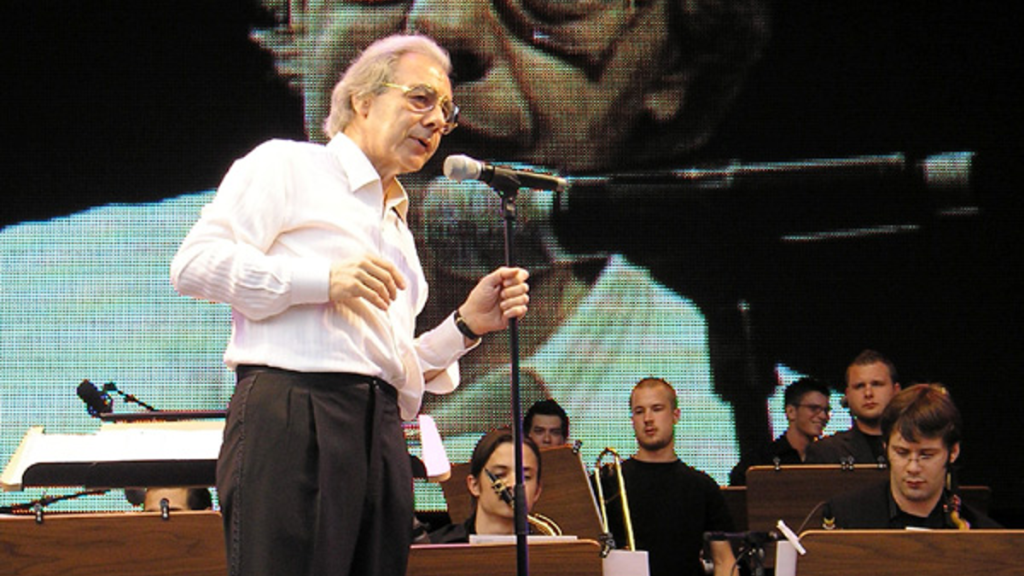
Photo Credit: Alexandra “Alexi” Spürk / CC by 2.5
Lalo Schifrin, the legendary composer behind “Mission: Impossible” and film scores like “Cool Hand Luke” and “Dirty Harry,” has died at 93.
Argentine musician Lalo Schifrin, the talent behind such iconic scores as “Mission: Impossible,” died on Thursday from complications due to pneumonia. He was 93.
The Grammy-winning composer produced several film and television scores during the 1960s and ‘70s that are now regarded as classics. These include the films “Cool Hand Luke,” “Dirty Harry,” and “Bullitt.” He was among the first to apply a wide range of musical genres and ideas to TV and film scores, from jazz to rock and just about everything in between.
In 2018, Schifrin became only the third composer in the history of the Academy of Motion Pictures Arts & Sciences to receive an honorary Oscar. Clint Eastwood, for whom Schifrin composed eight scores, presented this honor “in recognition of his unique musical style, compositional integrity, and influential contributions to the art of film scoring.”
“Composing for movies has been a lifetime of joy and creativity,” said Schifrin at the event. “Receiving this honorary Oscar is the culmination of a dream. It is a mission accomplished.”
Also at the event, actress Kathy Bates said of Schifrin: “His work cannot be easily labeled. Is what he creates jazz? Is it classical, contemporary, popular? The answer is yes, it is all of those things.”
Throughout his career, Schifrin was nominated for six Oscars, including nods for “Cool Hand Luke,” “The Fox,” “Voyage of the Damned,” and “The Amityville Horror.” However, he was always most well-known for his work in television, especially the theme from “Mission: Impossible.”
That track earned him two of his five Grammy Awards and three of his four Emmy nominations. The song also earned him lasting fame, initially for the 1960s TV series, and then for the theme’s continued use throughout Tom Cruise’s “Mission: Impossible” films, beginning in 1996.
“I wanted a little humor, lightness, a theme that wouldn’t take itself too seriously,” Schifrin said of the song, which includes an unusual time signature as “there is something unpredictable about 5/4.”
Lalo Schifrin was the son of a concertmaster of the Buenos Aires Philharmonic. He studied piano and attended Colegio Nacional University in his native Buenos Aires, where he paid to smuggle American jazz records into the country after Juan Peron’s regime forbid them.
A few short years later, he formed his own big band, and moved to the U.S. after a chance meeting with jazz legend Dizzy Gillespie. He worked as Gillespie’s pianist and arranger from 1960 to 1962, during which Schifrin wrote two large-scale jazz compositions for him: “Gillespiana” and “The New Continent.”
His work as a jazz composer led to an invitation to write for film and TV, and he moved to Hollywood in 1963. He wrote music for “The Alfred Hitchcock Hour,” “Kraft Suspense Theatre,” “The Man From U.N.C.L.E.,” and many more.
In the 1970s, he researched Asian music in order to score Bruce Lee’s 1973 film “Enter the Dragon.” This led director Brett Ratner, 25 years later, to hire Schifrin to compose for his “Rush Hour” films.
Schifrin wrote music for over 40 made-for-TV movies and miniseries from the ‘60s to the ‘90s, including “Doomsday Flight,” “Princess Daisy,” and “Don Quixote.” He also composed for TV series like “The Young Lawyers,” “Planet of the Apes,” and “Glitter.”
He served as music director of the Paris Philmarhomic and the Glendale Symphony during the late ‘80s and ‘90s. In 1998, he started his own record label, Aleph, with which he produced several acclaimed jazz and orchestral albums.
Schifrin’s last major work was a collaboration with another Argentinian composer, Rod Schejtman. “Long Live Freedom” was a 35-minute symphony dedicated to their country, which debuted on April 5.


